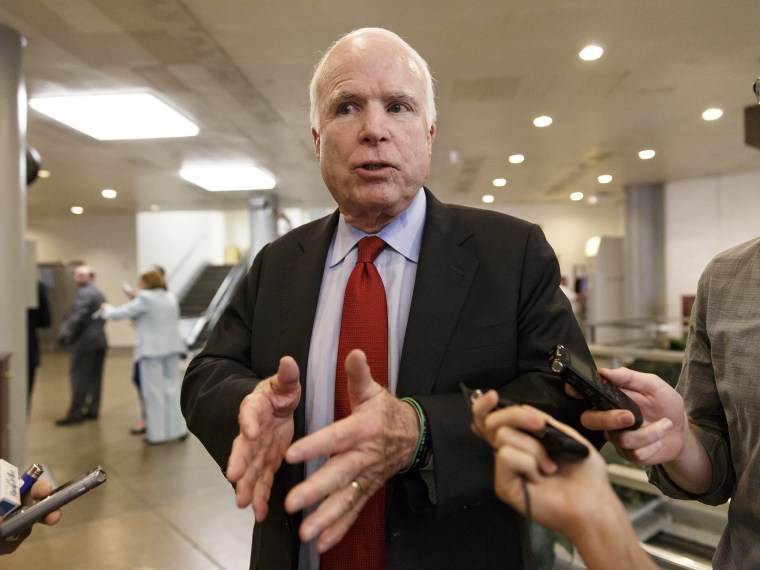Sen. John McCain (R-Ariz.) has reason to be pleased with his recent promotion. In the wake of the 2014 midterm elections, his party is not only in control of the Senate, but the Arizona Republican is now chairman of the Senate Armed Services Committee, a post he's reportedly wanted for quite a while.
But when the senator looks around the world, he isn't pleased at all.
"We are probably in the most serious period of turmoil in our lifetime," said the 78-year-old Republican from Arizona, whose control of the committee is the culmination of decades of tenacious advocacy for a muscular foreign policy. "Everything I've predicted, unfortunately, has come true, whether it be in Iraq or whether it be Syria."
The notion that all of John McCain's predictions have "come true" isn't just a bizarre boast, it's also laughably and demonstrably untrue. As Rachel put it on the show awhile back, "Let the record show, John McCain was wrong about Iraq and the war in Iraq in almost every way that a person can be wrong about something like that."
But it's this argument, which McCain has made before, that we're seeing "the most serious period of turmoil in our lifetime" that seems especially odd.
As we discussed the last time the senator made this assessment, McCain's lifetime includes the entirety of World War II, Vietnam, and the Cold War. To suggest turmoil is greater or more "serious" now may be politically convenient -- one assumes McCain is both eager to blame President Obama for unrest and anxious to make the case for more wars -- but it's also completely at odds with reality when considered in a historical context.
Dylan Matthews noted last week, "If anything, the world is safer than it's ever been. The threat of nuclear exchange between the US and the Soviet Union has lifted. Great power wars of the kind that plagued Europe until 1945 are a thing of the past. Peoples' odds of dying from violence, including warfare, have never been lower."
I'm also reminded a good piece from Fareed Zakaria along the same lines, noting conditions in 1973, the year McCain was released from a Vietnamese prison. That year, Zakaria noted, several hundred thousand people died as a result of the war in Vietnam, tens of thousands died in the Yom Kippur War, OPEC imposed an oil embargo, and Cold War tensions pushed the United States literally to DEFCON 3.
Today’s world is unpredictable, but it doesn’t compare with the kinds of geopolitical dangers that existed for decades during the Cold War, not to mention before that period. […]For all the problems, let’s keep in mind that we live today in a world with considerably fewer dangers. Nuclear war is unimaginable. The Russian-American nuclear arsenals are down to one-fifth their size in 1973 and at a much lower level of readiness. In 1973, Freedom House published its first annual account of political rights around the world. At the time, countries listed as “not free” outnumbered “free” countries. Today that is inverted, with the number of “free” countries having doubled. Open markets, trade and travel have boomed, allowing hundreds of millions to escape poverty and live better lives.Of course there are crises, problems and tensions around the world. But no one with any sense of history would want to go back in time in search of less turmoil.
Around the same time, President Obama delivered remarks to White House interns and stressed the same point: “[D]espite how hard sometimes the world seems to be, and all you see on television is war and conflict and poverty and violence, the truth is that if you had to choose when to be born, not knowing where or who you would be, in all of human history, now would be the time. Because the world is less violent, it is healthier, it is wealthier, it is more tolerant and it offers more opportunity than any time in human history for more people than any time in human history.”
This isn't to say that peace and stability reign around the globe. That's never been the case, and it probably never will be. But to see alarming developments, here and abroad, as evidence of a world unraveling is to focus far too much on the trees and not enough on the forest.
McCain has been around for real periods of international turmoil. It's easy, and perhaps ideologically satisfying, to insist conditions are worse now, but by literally no measure is that assessment accurate.
It's likely that the senator has a political goal in mind: if Americans believe the world is coming apart, and that instability is scary, maybe the public will blame the president and reward McCain and his allies. Perhaps McCain will even persuade people that a few more wars will ease global tensions and paradoxically reduce violence.
But reality suggests no one should take his rhetoric seriously.
